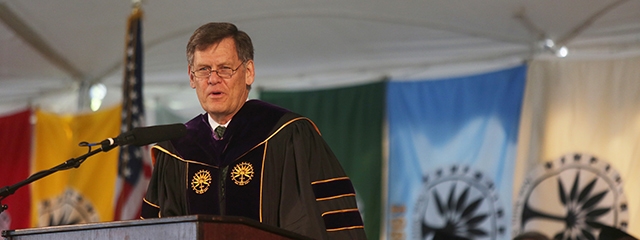Hampshire College President Jonathan Lash recently blogged for the Huffington Post on lifelong learning.
Whether college, high school, elementary school, or preschool age, today’s students are going to face challenges heretofore unknown. The pace of change is accelerating, and it’s estimated that 70 percent of them will end up in jobs not yet invented. They will collaborate with people on multiple continents, struggling to solve problems we don’t yet recognize.
How do we educate students to thrive in this rapidly changing world? Community, collaboration, and diversity are vitally important. Few work in isolation anymore. The world faces complex challenges far too large to be solved without the cooperative skills necessary to work in groups and across boundaries.
In a global marketplace of ideas, students will need to take up different perspectives and forge an ethical stance that is sensitive to cultural difference, while guided by fairness and justice. Empathy and respect are essential traits; students learn them in part by having their own ideas and contributions taken seriously within their early classroom communities.
Standardized tests, grades, and learning narrow skills seem like poor preparation for collaborative problem solving in a rapidly changing world. Learning to learn and relearn, and to pivot quickly and learn more and differently, over an intellectually agile lifetime, is key.
Working, as I do, at a college that was created to be an instrument of change, I agree with Hampshire’s founders that “the best learning is that in which the student progressively acquires the ability to teach [their]self.”
Lifelong learners internalize motivations and goals. This has implications for the education of college students, certainly, but also for our youngest learners and how they grow to understand themselves as they acquire fundamental skills and find confidence in what they can accomplish. Whether they’re 6, 12, 16, or 18, we need to make room for students to look at their own lives and ask, in their own ways, what is it that I want to get out of this life, out of this education?
Students at all levels need an education that lets them build on their curiosity, follow interests where they lead, and join a community of co-discoverers. This requires self-expression at whatever level the learner can do. For our college students, it involves negotiating their own educational paths, working with teachers to forge an educational plan that is rigorous, coherent, and interesting.
Collaboration, dialogue, and rigorous challenge should define the learning environment. The imperative our students at Hampshire have to work with and persuade mentors makes them entrepreneurial, self-reliant, and adaptive. They will be comfortable finding new approaches and inventing new careers.
Today’s students and tomorrow’s citizens need to know how to think, evaluate, and explore. They will need the creativity and the courage to challenge traditional ways of doing and working, and to forge new paths and solutions.
Such an education requires teachers who genuinely love teaching, encourage innovation, and will go where the learner is, discovering and building on the learner’s strengths. This includes willingness to engage in the process as co-learners. It isn’t unusual at Hampshire to have a biologist and musician, or a writer and philosopher, or a historian and animator, and so on, team up as a faculty committee working with a student on a project driven by the student’s interests.
When it comes to knowledge and skills, “gather and pursue” doesn’t stop. It’s an organic process. Ideally, it’s a joyful process. In those moments when things don’t go as planned, we try to remember that they’re college students. Or, teenagers. Or, children. Or, just human.
Real education can be inefficient, requiring exploration and allowing for stumbles along the way. Sometimes Hampshire students realize they’ve gone in a wrong direction in their work, but it’s in that discovery while struggling through ideas, investigating something previously not thought of, with lots of faculty support, that true magic occurs.






